One of the most unpleasant skin diseases is mycosis.Depending on the degree of damage, two categories of the disease are distinguished - dermatomycosis and onychomycosis.In the first case, the skin falls under the blow, and in the second - the nail plates.In order to successfully get rid of harmful microorganisms, you need to know how the fungus looks on the legs, from which it appears and how to deal with it.
Basic species
Specialists in the field of dermatology distinguish several types of fungi on the legs, which differ from each other in the nature of the influence and the pathogen.As for pathogenic microorganisms that cause the development of fungal diseases, they can be:
- mold;
- yeast;
- dermatophytes.
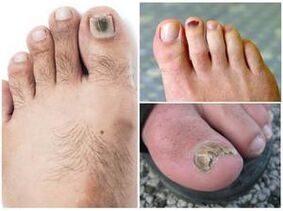 The impact of these parasites leads to the development of a dangerous pathology, which is called rubromicosis and means damage to the skin of the feet.In addition, the disease can differ in clinical manifestations and be membrane, Mokasinopodobnoy or Vesicular.
The impact of these parasites leads to the development of a dangerous pathology, which is called rubromicosis and means damage to the skin of the feet.In addition, the disease can differ in clinical manifestations and be membrane, Mokasinopodobnoy or Vesicular.
The progression of the fungus causes oversaturation of blood vessels with blood, dryness and peeling of the skin.In this case, the process itself occurs slowly and without significant symptoms.The first sensations of itching or burning make themselves felt only after a serious damage to the feet.Soon the process of nail deformation is launched, which causes the appearance of blisters, crusts, plaques and pustules.
If you do not take the necessary measures, the scale of the defeat will be colossal, and the walking process will become accompanied by pain.Knowing what the foot fungus looks like and how it manifests itself, the patient can turn to a specialist in time and avoid dangerous consequences.
When engaged in therapeutic treatment, it is important to know about the varieties of the disease.The method of combating the problem is determined only after a comprehensive examination under a microscope and the compilation of a clinical picture.To clean the skin from lesions, various drugs with exfoliating effects are used.Among them are ointments and creams containing salicylic acid. Also, comprehensive treatment includes antifungal drugs.
If the degree of damage is too heavy, highly effective tablets and mitigating agents are used.The success of the fight against pathology depends on the responsibility of the patient and his readiness to begin treatment in time.
Methods of infection
There are many causes and factors that determine the damage to the nails with fungal diseases.In most cases, this occurs in a direct way - when contacting nail plates with soil or vegetation, sick people or animals. As for the indirect ways, they look as follows:
- If a person uses objects and personal things of the one who is a carrier of the fungus.
- If a person is in contact with things designed to care for a pet.
There are also a lot of predetermining factors that increase the risk of mycosis.These include age-related features, since young children are much more likely to suffer from the disease due to excessively thin skin and the lack of necessary protective functions in the body.
The fungal infection also attacks the patient with a worsened state of immunity.If the immune system is weakened, it is not able to fight such manifestations, which leads to destructive processes.
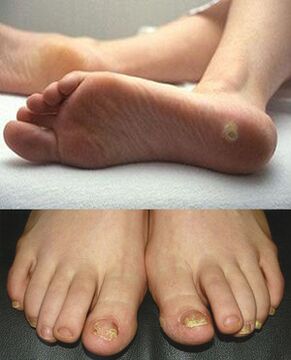
Among other factors, they highlight:
- Not enough good work of the nervous and endocrine systems.For this reason, weakening of protective mechanisms occurs.
- The development of chronic infectious diseases that negatively affect immunity, increasing the likelihood of fungi development.
- Excessive sweating of the foot.Such a nuisance is an innate pathology or the result of the use of uncomfortable shoes.
- Changing the composition of sweat.Such a process creates a nutritious environment for fungal microorganisms, which leads to their activation.
Symptoms of Rubrofitia
A parasite called TR.Mentagrophytesvar is the main causative agent of a dangerous fungal disease of Rubrophytius.Possessing tiny dimensions, it instantly equips in the horn or granular skin layers, causing the development of allergies and other unpleasant processes. In most cases, the life of the pest is accompanied by the following reactions:
- The formation of bubbles with a dense crust.
- The appearance of pustules and edema.
- Mass corroding of the skin.
- The appearance on the skin of scales and crusts that cause painful sensations.
- Yellowing and deformation processes in the nail plates.
Intensive itching and the development of pain during walking are also not excluded.During the clinical examination, the specialist draws up a general picture and describes the symptoms, conducting the study of the scraper.
If the disease progresses rapidly and acquires an acute shape, the patient can prescribe silver nitrate 0.25%, resorceceine 1%and calcium 10%.To combat allergic manifestations, antihistamines use.In severe cases, Rubrophytius symptoms fight with the help of highly effective drugs against the fungus.
Candidiasis of the stop
Candidias of the feet rarely develop.The causative agent of the disease is dangerous fungi of the genus Candida, which peacefully exist in every organism, but relate to conditionally dangerous and do not pose a great threat.But if the number of microorganisms begins to grow, this leads to uncomfortable sensations and serious health consequences.This is facilitated by additional factors, including the deterioration of the immune system, frequent hypothermia, stressful situations and an unhealthy lifestyle. As for external factors, they include:
- A long stay in water, which causes the mass compartment of the skin layers from each other.
- Household or industrial injuries.
- The use of shoes that are not suitable in size or material.
Manifestations of onychomycosis
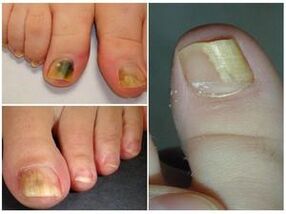 Trying to understand how the fungus on the fingers looks like, you need to know about another dangerous variety of pathology - onychomycosis.Its development is accompanied by a fungal damage to the nails after water procedures in common pools, showers and saunas.In terms of propagation, the disease is not inferior to Mycosis, since scales with dangerous parasites are rapidly separated from the nail plates, and then are located on fabric surfaces, benches or carpets.If there is increased humidity in the environment, then the pest not only falls into comfortable conditions, but also begins to work on the reproduction of the colony.
Trying to understand how the fungus on the fingers looks like, you need to know about another dangerous variety of pathology - onychomycosis.Its development is accompanied by a fungal damage to the nails after water procedures in common pools, showers and saunas.In terms of propagation, the disease is not inferior to Mycosis, since scales with dangerous parasites are rapidly separated from the nail plates, and then are located on fabric surfaces, benches or carpets.If there is increased humidity in the environment, then the pest not only falls into comfortable conditions, but also begins to work on the reproduction of the colony.
In the first stages, the pathogen affects the skin of the feet, causing a feeling of itching.As a result, the patient really wants to scratch the foot, but this only exacerbates the problem.Soon the skin is covered with tiny cracks and scratches, and pathogenic microorganisms begin to equip under the nail and actively multiply.
The probability of a collision with pathology increases many times with injuries of nails, unbalanced circulation of blood and the presence of complex diseases, including diabetes and sexually transmitted diseases.
Depending on the shape and degree of lesion, onychomycosis is divided into three groups:
- Normotorophical.With its development, the color of the nail plates becomes yellowish-brown.The thickness and shape of the nail remain the same.
- Hypertrophic.It causes the final change of color, loses of shine and deformation of the shape of the nails.This type of onychomycosis causes pain, not allowing the patient to move freely.The problem can aggravate the wearing of uncomfortable shoes.
- Oniholitichesky.Pathology leads to a change in the shade of nails, as a result of which they become brown.Also, the plates lose their usual strength and begin to separate.In open areas of the nail bed, deformed layers appear.
Effective treatment
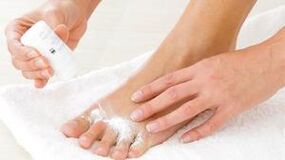 To treat the disease, it is practically useless to use local antifungal drugs, which is explained by the deep penetration of microorganisms under the nails.Before starting the fight against pathology, it is necessary to localize the fungus.For this, experts prescribe keratolytic drugs or patchings to the patient.Sometimes the problem is solved mechanically, cutting the deformed and dead sections of the nail plate with a file or special bites.When performing such a procedure, you need to make sure that the tool is clean.
To treat the disease, it is practically useless to use local antifungal drugs, which is explained by the deep penetration of microorganisms under the nails.Before starting the fight against pathology, it is necessary to localize the fungus.For this, experts prescribe keratolytic drugs or patchings to the patient.Sometimes the problem is solved mechanically, cutting the deformed and dead sections of the nail plate with a file or special bites.When performing such a procedure, you need to make sure that the tool is clean.
The most effective way to combat onychomycosis is the integrated use of plasters and mechanical nail purification.In the form of a keratolytic agent, a therapeutic set consisting of a patch, files and a special ointment can be used.At the end of the nail removal procedure, you must use systemic antimycots.
Folk remedies
To get rid of fungal lesions of the feet is quite real without the help of a specialist.However, self -medication should be treated with special responsibility, realizing that such a process may require a lot of time and effort.It is necessary to take into account the fact that various fungi react in their own way to the effects of any drugs or folk remedies.With improper use, home medicine can only aggravate the problem, contributing to the localization of parasites.
To avoid such a development of events and successfully destroy the colony of fungi, you should combine the correct cleansing of the skin with the cleansing of the body from pathogenic microorganisms and a comprehensive restoration of the epidermis layer.For these purposes, it is advisable to use baths, as well as daily wiping the feet and palms of antiseptics. 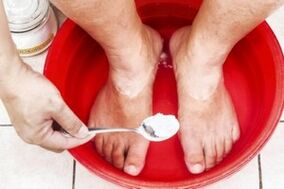 The most effective cleansing products for baths are considered:
The most effective cleansing products for baths are considered:
- Boric Acid;
- apple cider vinegar;
- hydrogen peroxide.
To prepare the bath, you need to take 20 grams of one of the above compounds and diluted in a liter of boiled water.After that, the legs are placed in the solution for 20-40 minutes.To notice a significant improvement in the condition of the nails, it is enough to regularly carry out such procedures for several weeks.
To clean the skin from redness, itching and burning, it is recommended to wipe the feet with a soda composition daily with salt.A good antibacterial and anti -inflammatory scrub can be a mixture of equal number of minerals and essential oils.The selected components are mixed, and the affected areas are covered with the finished mass.
A serious enemy of the fungus is tar soap.It consists of a birch tar, which has long been considered one of the most powerful antibacterial substances.It must be applied to the affected areas and washed off after 5 minutes.The course of treatment with such soap takes two weeks.At the end of the procedure, the skin is treated with cream or zinc ointment.
Hardware solutions
If the problem of damage to the nails with a fungus is greatly aggravated, and any folk or official funds practically do not give any results, you can use an innovative solution - hardware treatment.This method is characterized by high efficiency and can be the only salvation in cases where the rest of the drugs are powerless.
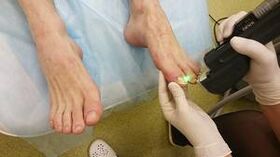
Among the available techniques of the most common, laser processing using an erbium laser is considered.He cauterizes mycelium and allows you to get rid of visible symptoms of the fungus of the nail plates.In addition, the technology allows you to cleanse the skin near the nails, between the fingers and on the feet, returning it to the previous elasticity and attractiveness.
Subject to the basic rules of skin care with fungal diseases of the legs, destroying a dangerous pathology is quite real.It is important not to postpone treatment for the future and take appropriate measures immediately with the development of dubious symptoms.
















